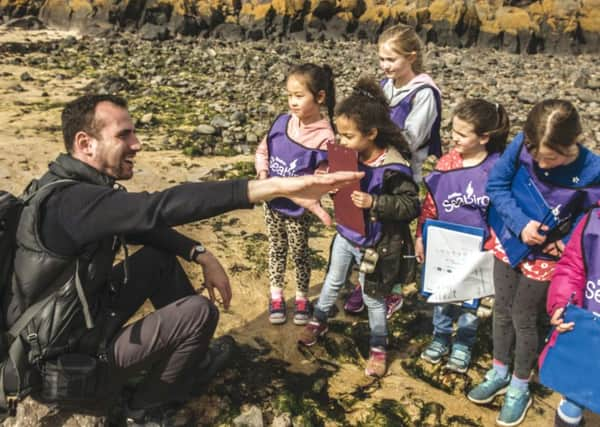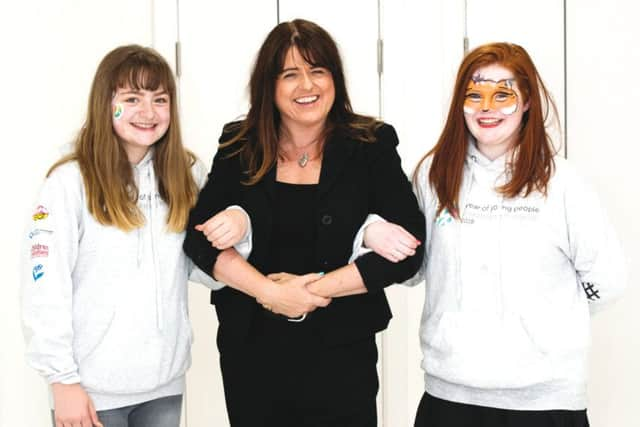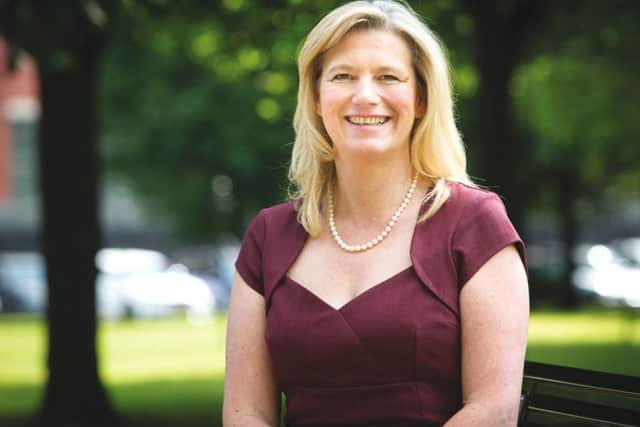Vision Voices: How can business engage better with the younger generation?


Louise Macdonald – Chief executive, Young Scot
When did your business last give young people the freedom to tell you exactly what they think and what you should be doing?
I promise you, it will be one of the most exciting things you can do for your business


Advertisement
Hide AdAdvertisement
Hide AdAt Young Scot, young people shape our strategy, sit on our board and lead everything we do. But you don’t need to be a Young Scot to benefit from the insight of young people.
For example, the National Trust for Scotland worked with young people to find ways to boost their membership.
With recommendations on communication, events, partnerships and pricing, the Heritage Blueprint report makes interesting reading for any organisation looking to improve their engagement with young people.
Any business can get involved in the Year of Young People 2018 and we’re working with Communic18, a group of co-design champions for next year who are here to help. Get in touch and let them inspire you.


Malcolm Roughead – Chief executive, VisitScotland
We have to place our trust in young people because they are an investment for the future.
In order to encourage them to see the Scottish tourism industry as a highly attractive proposition as a career, we need to start early.
At VisitScotland we now have dozens of trained staff who go out to Scottish schools to inform them about the opportunities in the tourism sector.


A career in tourism is accessible to so many people and what we really need are people with a great attitude and a keenness to promote our fantastic country.
Advertisement
Hide AdAdvertisement
Hide AdIt is not about qualifications, it’s about attitude and how to bring out the best talent.
We need to get a stronger foothold into Scotland’s colleges and the universities and we are already undertaking mentoring work in our business schools and have embraced the Modern Apprenticeship programme.
Our young people deserve a chance to flourish.


Julie Ashworth – Chair, IoD Scotland’s Edinburgh branch
Young people need to be trusted with responsibility and accountability early on, as there is often a very old-fashioned assumption that experience is directly related to age.
IoD Scotland is very involved in a number of initiatives promoting the talents of young people, as they harness the art of the possible, and have a terrific depth of experience that is more relevant than ever to today’s workplace.
The more exposure young people have to real employers and employment, the quicker they can learn to put their own relevant experience to work in a variety of settings.
Claire Gillespie – Key sector manager for ICT and digital technology skills, Skills Development Scotland
Sustainable working partnerships between companies, schools and coding clubs are vital to inspire young people to work in digital.


One-off experiences simply aren’t enough to take young people to the next stage.
Advertisement
Hide AdAdvertisement
Hide AdWe need industry to get stuck in and play its part in fixing the skills gap.
Digital World and Digital Xtra offer loads of great projects for companies to get involved with.
And what better way to bring the world of work to life than by giving young people real-life work experience through Foundation Apprenticeships.
I’d encourage employers to take a chance and be open to employing school leavers, apprentices and college as well as traditional university graduates.
And let’s not leave it to the big companies. Some of the greatest innovation comes from start-ups and can really inspire young people.
By working together we can present the strength and diversity of the whole digital sector and grow a new generation of digital makers.
Fraser Kelly – Chief executive, Social Enterprise Scotland
In some ways I think it’s the job of dads to be grumpy… “switch the lights off, wear a sweater if you’re cold, finish what’s on your plate...”
I’m beginning to sound like my own father. Does anyone listen… why should they?
Advertisement
Hide AdAdvertisement
Hide AdThat said, our daughter has chosen to do a school project on food waste.
She loves facts and figures but says she feels sad that over a third of all food produced in the world goes to waste; that each year an area larger than the land mass of China is used to produce food that is never eaten; and that, in the developed world, 50 per cent of all food waste happens at home.
We don’t want to impose upon her and realise we can only stand beside her as she makes her own choices in life but we are excited that she appears keen to be an active citizen. It’s worth listening to the young ones, the future is in their hands.
Rachel Moir – Skills programme manager, IBioIC
To encourage young people to make a positive contribution to their economy’s future, it is vital that they feel like they have the power to make a progressive change.
By engaging them in schools at an early stage in their own learning and development – in STEM subjects in particular we can gain significant headway in the skills development of the next generation to match the needs of current and emerging industries, all the while providing a talented and innovative pipeline of skilled workers to drive the economy forward and improve the lives of others.
The present system is very much a one-sided approach with young people having very little influence on their fate until early adulthood.
For this to change, dynamic and industry-relevant training schemes and career pathways need to be in place, which will require a substantial investment from both business and government.
Andrew Grieveson – Education officer, the Scottish Seabird Centre
Advertisement
Hide AdAdvertisement
Hide AdOcean plastics, marine conservation and environmental issues are all hot topics just now, especially with Blue Planet 2 on our screens.
At the Scottish Seabird Centre, we are working on plans to diversify what we do – we want to look at life above and below the waves, presenting cutting-edge research taking place across Scotland.
We also want to significantly increase our formal education provision in the classroom, as well as via outreach and online resources.
Engaging young people has been an essential part of our research process as we have interviewed school children about how they would like to learn and what they would like to learn about, as well as trialling workshops at schools before formally launching them.
It’s essential that we provide learning opportunities that not only are linked to the curriculum, but that children will benefit from. The contributions we have had from young people have had a significant impact on our future plans.
Pete Cheema – Chief executive, Scottish Grocers Federation
There are 5,300 convenience stores in Scotland. These stores provide 41,000 jobs and contribute about £530 million to Scotland’s economy each year in gross value added.
Convenience stores provide genuinely local jobs – most staff live within a one mile radius of the store.
Currently about 20 per cent of staff in independent convenience stores are under the age of 25.
Advertisement
Hide AdAdvertisement
Hide AdA job in retail is a very effective way for young people to gain a foothold in the labour market.
Independent stores are very adept at building flexible job opportunities around staff.
If a young person is studying, for example, the store will be very willing to create a shift pattern which takes their course work into account.
Retail is still the largest private sector employer in Scotland.
There are huge potential opportunities to boost the levels of young people working in the sector. Creating effective partnerships in the key to doing this.
Siobhán Jordan – Director, Interface
Young people can make a huge contribution to business and society. We have seen at first hand the benefits of supporting young people who have proved that age is no barrier to achieving business success, given the right support.
Pupils at Wick High School were developing an innovative product, Envirocache, after they identified that childhood obesity could be linked to overuse of mobile devices and wanted to use technology to encourage young people and their families to get outdoors and be more active.
With the help of Caithness Chamber of Commerce, Interface and the Scottish Funding Council, the pupils collaborated with Robert Gordon University to prepare a demonstrator for market.
Advertisement
Hide AdAdvertisement
Hide AdOne of the pupils, Ellora James, was recently named “one to watch” in the Scottish Women in Technology awards.
The development of talent and skills on both sides of business-academic partnerships is immensely valuable.
Small-scale feasibility studies can morph into enhanced student learning, which in turn can lead to full-time employment.
Ken Hay – Chief executive, The Centre for the Moving Image
Film is the language of the 21st century – it’s how people of all ages increasingly tell stories, whether through their mobile phone or tablet, through television, or in a big dark communal space, the cinema.
Young people are of course the natives of this new world – both as the film-makers and as the audiences and consumers.
The Year of Young People provides the perfect opportunity to build on and promote Edinburgh International Film Festival and Filmhouse’s existing work with and for young people. At the core of this activity is our Young Programmers initiative and EIFF Youth Hub. These have been key to engaging young people with EIFF – not only in educating them about cinema, but also in helping to open doors to the multitude of career paths in the arts and screen sectors.
The Young Programmers will also be responsible for curating a dedicated strand of films at the 2018 EIFF under the banner, “The Young and the Wild”.
As well as screenings of the best in contemporary world cinema, there will be workshops for primary and secondary schools, in-person events and masterclasses, careers events and advice, and networking events for young film-makers and film enthusiasts.
Phil Prentice – Chief officer, Scotland’s Towns Partnership
Advertisement
Hide AdAdvertisement
Hide AdScotland’s theme years have been a great way to provide a focus on big societal issues – from history and heritage to tourism, architecture and more.
Next it will be the Year of Young People: Scotland’s next generation, our successors.
At Scotland’s Towns Partnership we had already recognised the importance of listening to and engaging youth in our agenda.
We welcomed a young Scot to join our board a year ago to ensure the voice, talent, energy and opinions of young people weren’t being overlooked as we developed a platform to reinvent and repurpose our towns.
In the same vein, we work closely with the Children’s Parliament and Planning Aid Scotland on their youth programmes. We also have a couple of direct initiatives planned to look at how housing, co-working space and digital solutions can help provide a range of new opportunities targeting our younger demographic and these will all be co-designed by young people to ensure we meet their needs.
These include co-living products to meet the unique and changing demands of millennials and a virtual school platform delivered over towns’ digital infrastructure targeting our most disadvantaged young people.
We look forward to an exciting year where the theme can concentrate our collective efforts on our most precious asset – our next generation.
Esther Black – Head of corporate operations, Crown Estate Scotland
Advertisement
Hide AdAdvertisement
Hide AdBusiness can better engage with young people by inspiring them and giving them opportunities to learn and develop.
At Crown Estate Scotland, although we are a small business with only 40 people, we do all we can to make sure it is a great place to work.
To ensure we give younger staff the opportunity to develop, our working groups on key issues such as risk management, IT and business planning are increasingly composed of staff at all levels and ages.
By ensuring these forums are diverse, with younger as well as more experienced staff, we get the best results – and our rising talent get the chance to learn and develop.
Increasingly, we see young people who are driven by values and purpose rather than profit and status.
As a business focused on providing wider public benefits, this fits well with our overall approach and we will give weight to this type of attitude and outlook when recruiting.
We also sponsor initiatives such as Scottish Council for Development & Industry’s STEM education programme. This year we helped provide resources to schools to research and design an offshore wind turbine, inspiring young people to consider the range of careers in the low carbon economy.
We also need to recognise the importance of play in a child’s development, and outdoor experiences in giving young people new opportunities.
Advertisement
Hide AdAdvertisement
Hide AdAt our Glenlivet Estate we welcome about 350 children every year to learn, play and explore with hands-on activities covering biodiversity, forestry and land use.
We also work with the Wilderness Foundation to host disadvantaged young people there to learn estate management and conservation, as well as to experience the health benefits of being outdoors.
This article appears in the WINTER 2017 edition of Vision Scotland. Further information about Vision Scotland here.